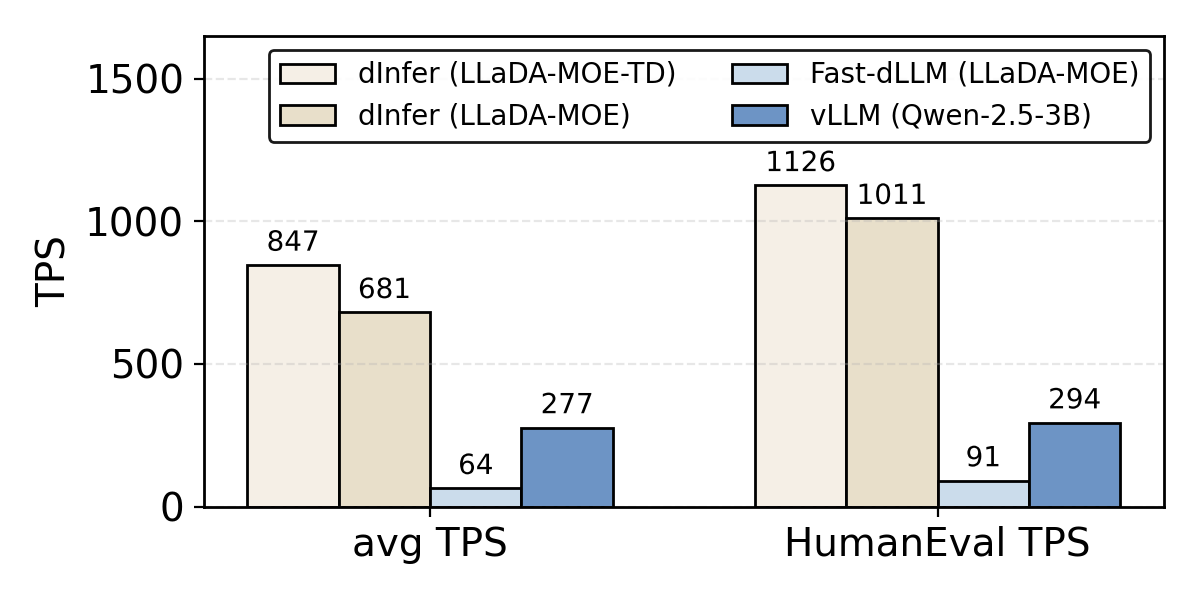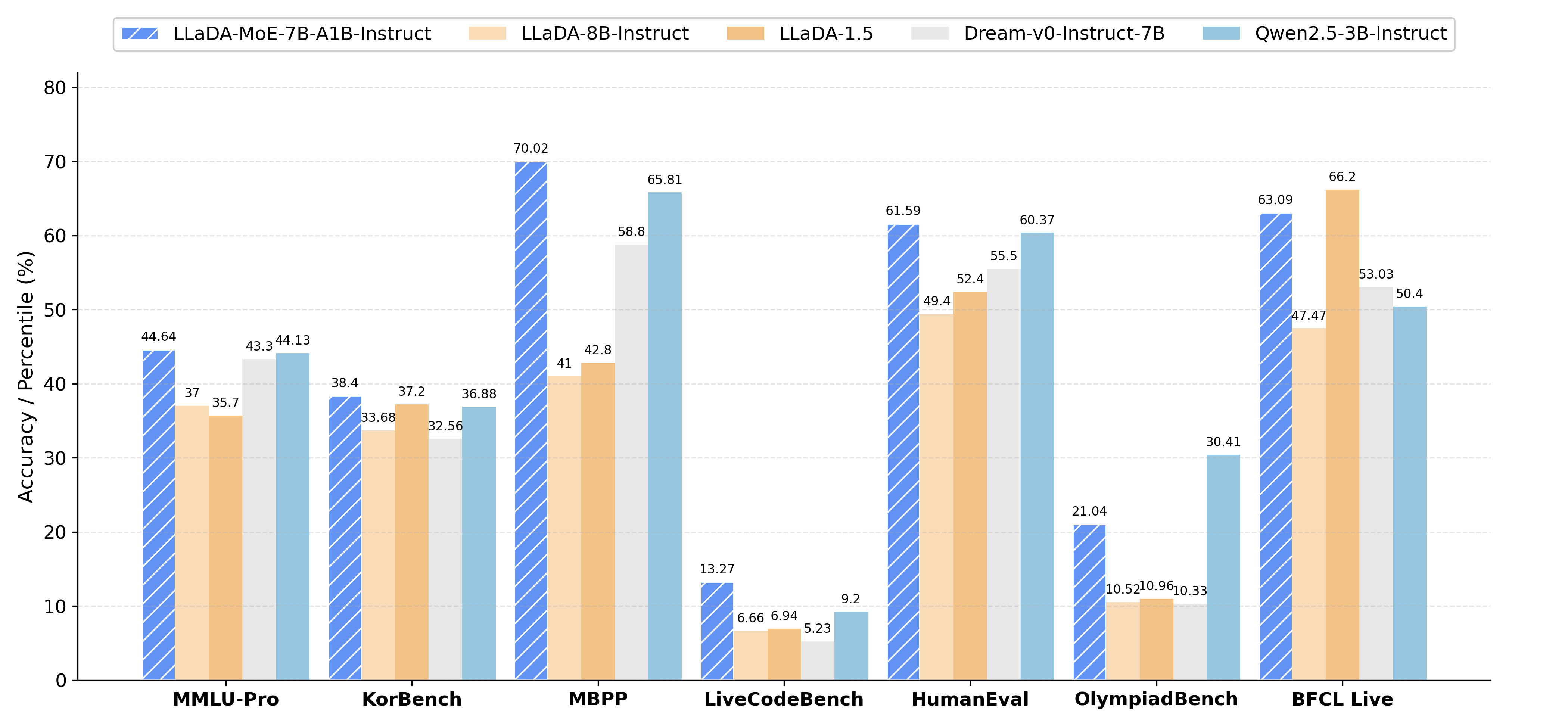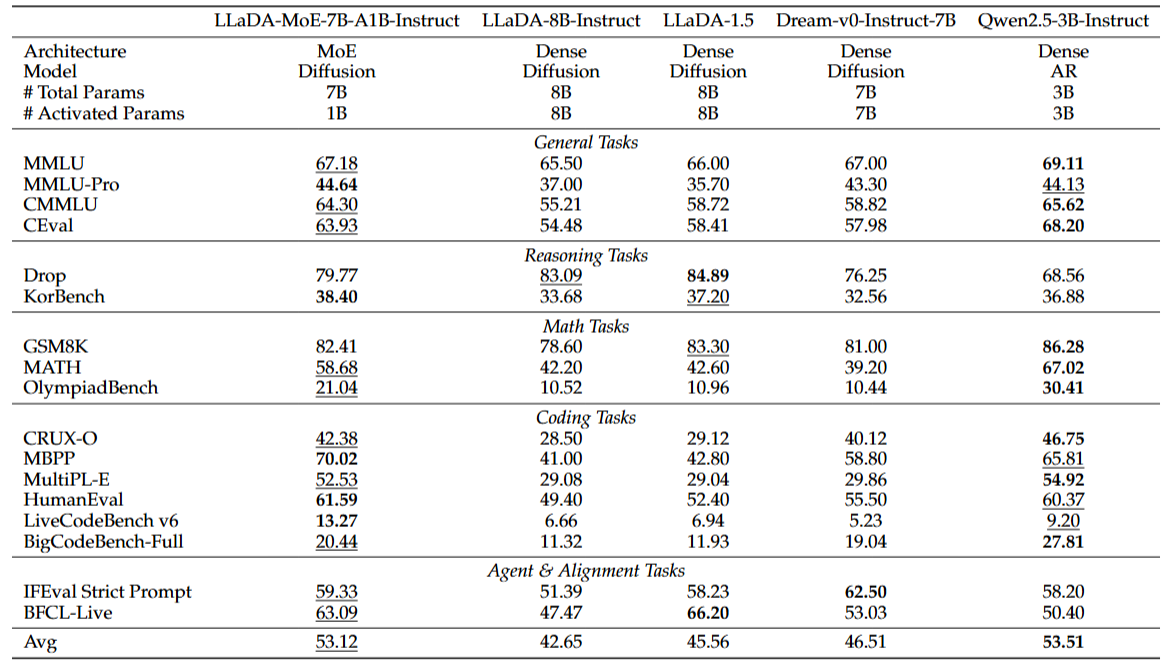---
library_name: transformers
license: apache-2.0
tags:
- dllm
- diffusion
- llm
- text_generation
pipeline_tag: text-generation
---
# LLaDA-MoE
This model is based on the principles described in the paper [Large Language Diffusion Models](https://huggingface.co/papers/2502.09992).
- 📚 [Paper On The arXiv](https://arxiv.org/abs/2509.24389)
- 🏠 [Project Page](https://ml-gsai.github.io/LLaDA-demo/)
- 💻 [Code](https://github.com/ML-GSAI/LLaDA)
**LLaDA-MoE** is a new and upgraded series of the LLaDA diffusion language model. This pre-release includes two cutting-edge models:
- `LLaDA-MoE-7B-A1B-Base`: A base pre-trained model designed for research and secondary development.
- `LLaDA-MoE-7B-A1B-Instruct`: An instruction-tuned model optimized for practical applications.
- `LLaDA-MoE-7B-A1B-Instruct-TD`: A specialized instruction-tuned model, further optimized for accelerated inference using Trajectory Distillation.
---
## 🚀 Performance Highlights
- **Leading MoE Architecture**:
The first open-source **Mixture-of-Experts (MoE) diffusion large language model**, pre-trained from scratch on approximately **20 trillion tokens**.
- **Efficient Inference**:
With **7 billion total parameters**, only **1.4 billion** are activated during inference. LLaDA-MoE significantly reduces computational costs while outperforming open-source dense models of similar scale.
- **Impressive Performance on Code & Complex Reasoning**:
Excels in tasks such as **code generation** and **advanced mathematical reasoning**, demonstrating strong reasoning capabilities.
- **Tool Use**:
Supports **tool calling** and achieves excellent performance in complex agent-based tasks.
- **Open & Extensible**:
Fully open-source with commitment to transparency. We plan to release a **leading inference framework** in the future and continue investing in cutting-edge areas like **diffusion LLMs (dLLM)** to drive disruptive innovation.
---
## 📦 Model Variants
| Model ID | Description | Hugging Face Link |
|--------|-------------|-------------------|
| [`inclusionAI/LLaDA-MoE-7B-A1B-Base`](https://huggingface.co/inclusionAI/LLaDA-MoE-7B-A1B-Base) | Base pre-trained model for research and fine-tuning. | [🤗 Model Card](https://huggingface.co/inclusionAI/LLaDA-MoE-7B-A1B-Base) |
| [`inclusionAI/LLaDA-MoE-7B-A1B-Instruct`](https://huggingface.co/inclusionAI/LLaDA-MoE-7B-A1B-Instruct) | Instruction-tuned model, ready for downstream applications. | [🤗 Model Card](https://huggingface.co/inclusionAI/LLaDA-MoE-7B-A1B-Instruct) |
| [`inclusionAI/LLaDA-MoE-7B-A1B-Instruct-TD`](https://huggingface.co/inclusionAI/LLaDA-MoE-7B-A1B-Instruct-TD) | An instruction-tuned model further optimized with **Trajectory Distillation (TD)** for accelerated inference. Decodes multiple tokens per forward pass. | [🤗 Model Card](https://huggingface.co/inclusionAI/LLaDA-MoE-7B-A1B-Instruct-TD) |
---
## 🔍 Model Overview
**LLaDA-MoE-7B-A1B** has the following specifications:
- **Type**: Mixture-of-Experts (MoE) Diffusion Language Model
- **Total Parameters (Non-Embedding)**: 7.03B
- **Number of Layers**: 16
- **Attention Heads**: 16
- **Context Length**: 4,096 tokens
- **Position Embedding**: Rotary (RoPE)
- **Vocabulary Size**: 157,184
---
## ⚡ Infra
### 1. We highly recommend you generate with [dInfer](https://github.com/inclusionAI/dInfer)(1000+ Tokens/S)

Figure: Display of generation speed
On HumanEval, dInfer achieves over 1,100 TPS at batch size 1, and averages more than 800 TPS across six benchmarks on
a single node with 8 H800 GPUs.
#### Install dInfer
```
git clone https://github.com/inclusionAI/dInfer.git
cd dInfer
pip install .
```
#### Convert to FusedMoE
Use the conversion tool to fuse the experts.
```bash
# From repo root
python tools/transfer.py \
--input /path/to/LLaDA-MoE-7B-A1B-Instruct \
--output /path/to/LLaDA-MoE-7B-A1B-Instruct-fused
```
#### Use the model in dInfer
```python
import torch
from transformers import AutoTokenizer
from dinfer.model import AutoModelForCausalLM
from dinfer.model import FusedOlmoeForCausalLM
from dinfer import BlockIteratorFactory, KVCacheFactory
from dinfer import ThresholdParallelDecoder, BlockWiseDiffusionLLM
m = "/path/to/LLaDA-MoE-7B-A1B-Instruct-fused"
tok = AutoTokenizer.from_pretrained(m, trust_remote_code=True)
model = AutoModelForCausalLM.from_pretrained(m, trust_remote_code=True, torch_dtype="bfloat16")
decoder = ThresholdParallelDecoder(0, threshold=0.9)
dllm = BlockWiseDiffusionLLM(model, decoder, BlockIteratorFactory(True), cache_factory=KVCacheFactory('dual'))
prompt = "Lily can run 12 kilometers per hour for 4 hours. After that, she can run 6 kilometers per hour. How many kilometers can she run in 8 hours?"
input_ids = tokenizer(prompt)['input_ids']
input_ids = torch.tensor(input_ids).to(device).unsqueeze(0)
res = dllm.generate(input_ids, gen_length=gen_len, block_length=block_len)
```
### 2. No Speedup: transformers
Make sure you have `transformers` and its dependencies installed:
```python
import torch
import numpy as np
import torch.nn.functional as F
from transformers import AutoTokenizer, AutoModel
def add_gumbel_noise(logits, temperature):
if temperature == 0:
return logits
logits = logits.to(torch.float64)
noise = torch.rand_like(logits, dtype=torch.float64)
gumbel_noise = (- torch.log(noise)) ** temperature
return logits.exp() / gumbel_noise
def get_num_transfer_tokens(mask_index, steps):
mask_num = mask_index.sum(dim=1, keepdim=True)
base = mask_num // steps
remainder = mask_num % steps
num_transfer_tokens = torch.zeros(mask_num.size(0), steps, device=mask_index.device, dtype=torch.int64) + base
for i in range(mask_num.size(0)):
num_transfer_tokens[i, :remainder[i]] += 1
return num_transfer_tokens
@ torch.no_grad()
def generate(model, prompt, steps=128, gen_length=128, block_length=128, temperature=0.,
cfg_scale=0., remasking='low_confidence', mask_id=156895):
x = torch.full((1, prompt.shape[1] + gen_length), mask_id, dtype=torch.long).to(model.device)
x[:, :prompt.shape[1]] = prompt.clone()
prompt_index = (x != mask_id)
assert gen_length % block_length == 0
num_blocks = gen_length // block_length
assert steps % num_blocks == 0
steps = steps // num_blocks
for num_block in range(num_blocks):
block_mask_index = (x[:, prompt.shape[1] + num_block * block_length: prompt.shape[1] + (num_block + 1) * block_length:] == mask_id)
num_transfer_tokens = get_num_transfer_tokens(block_mask_index, steps)
for i in range(steps):
mask_index = (x == mask_id)
if cfg_scale > 0.:
un_x = x.clone()
un_x[prompt_index] = mask_id
x_ = torch.cat([x, un_x], dim=0)
logits = model(x_).logits
logits, un_logits = torch.chunk(logits, 2, dim=0)
logits = un_logits + (cfg_scale + 1) * (logits - un_logits)
else:
logits = model(x).logits
logits_with_noise = add_gumbel_noise(logits, temperature=temperature)
x0 = torch.argmax(logits_with_noise, dim=-1) # b, l
if remasking == 'low_confidence':
p = F.softmax(logits, dim=-1)
x0_p = torch.squeeze(
torch.gather(p, dim=-1, index=torch.unsqueeze(x0, -1)), -1) # b, l
elif remasking == 'random':
x0_p = torch.rand((x0.shape[0], x0.shape[1]), device=x0.device)
else:
raise NotImplementedError(remasking)
x0_p[:, prompt.shape[1] + (num_block + 1) * block_length:] = -np.inf
x0 = torch.where(mask_index, x0, x)
confidence = torch.where(mask_index, x0_p, -np.inf)
transfer_index = torch.zeros_like(x0, dtype=torch.bool, device=x0.device)
for j in range(confidence.shape[0]):
_, select_index = torch.topk(confidence[j], k=num_transfer_tokens[j, i])
transfer_index[j, select_index] = True
x[transfer_index] = x0[transfer_index]
return x
device = 'cuda'
model = AutoModel.from_pretrained('inclusionAI/LLaDA-MoE-7B-A1B-Instruct', trust_remote_code=True, torch_dtype=torch.bfloat16).to(device).eval()
tokenizer = AutoTokenizer.from_pretrained('inclusionAI/LLaDA-MoE-7B-A1B-Instruct', trust_remote_code=True)
prompt = "Lily can run 12 kilometers per hour for 4 hours. After that, she runs 6 kilometers per hour. How many kilometers can she run in 8 hours?"
m = [
{"role": "system", "content": "You are a helpful AI assistant."},
{"role": "user", "content": prompt}
]
prompt = tokenizer.apply_chat_template(m, add_generation_prompt=True, tokenize=False)
input_ids = tokenizer(prompt)['input_ids']
input_ids = torch.tensor(input_ids).to(device).unsqueeze(0)
text = generate(model, input_ids, steps=128, gen_length=128, block_length=32, temperature=0., cfg_scale=0., remasking='low_confidence')
print(tokenizer.batch_decode(text[:, input_ids.shape[1]:], skip_special_tokens=False)[0])
```
## 📚 Citation [LLaDA-MoE](https://arxiv.org/abs/2509.24389)
If you find LLaDA-MoE useful in your research or applications, please cite our paper:
```
@article{zhu2025llada,
title={LLaDA-MoE: A Sparse MoE Diffusion Language Model},
author={Fengqi Zhu and Zebin You and Yipeng Xing and Zenan Huang and Lin Liu and Yihong Zhuang and Guoshan Lu and Kangyu Wang and Xudong Wang and Lanning Wei and Hongrui Guo and Jiaqi Hu and Wentao Ye and Tieyuan Chen and Chenchen Li and Chengfu Tang and Haibo Feng and Jun Hu and Jun Zhou and Xiaolu Zhang and Zhenzhong Lan and Junbo Zhao and Da Zheng and Chongxuan Li and Jianguo Li and Ji-Rong Wen},
journal={arXiv preprint arXiv:2509.24389},
year={2025}
}
```
---
## 🌐 License
This project is licensed under the terms of the [Apache License 2.0](https://www.apache.org/licenses/LICENSE-2.0).
---
## 🤝 Contact & Collaboration
For questions, collaborations, or feedback, please reach out via [Hugging Face](https://huggingface.co/inclusionAI/LLaDA-MoE-7B-A1B-Base) or open an issue in the [repository](https://github.com/inclusionAI).
👉 Join us in advancing open, efficient, and intelligent language models! 



